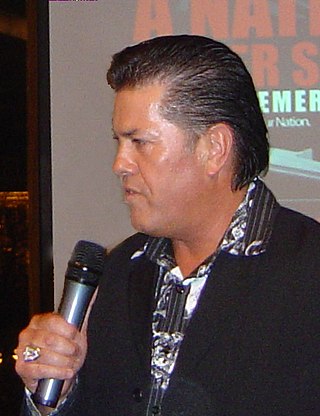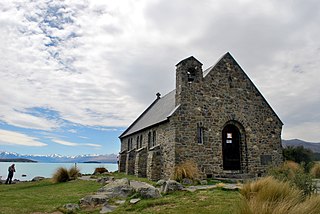Related Research Articles

This article discusses Christian politics in New Zealand.

Destiny New Zealand was a Christian political party in New Zealand centred on the charismatic/pentecostal Destiny Church. The party described itself as "centre-right". It placed a strong focus on socially conservative values and argued that the breakdown of the traditional family was a primary cause of many of New Zealand's problems. It announced its de-registration as a political party on 18 September 2007, and was removed from the register a month later. It did not hold any seats in Parliament.

Destiny Church is a New Zealand fundamentalist, Christian pentecostalist movement that has its headquarters in Auckland, and is politically placed on the far-right. The church advocates strict adherence to biblical morality, and has a reputation for its position against homosexuality, for its patriarchal views and for its calls for a return to biblical conservative family values and morals. It also teaches prosperity theology and, more recently, COVID-19 conspiracy theories, the latter of which includes the denial of the virus' existence altogether.

Brian Raymond Tamaki, is a New Zealand Māori fundamentalist Christian religious leader, conspiracy theorist, and far-right political activist. He is the leader of Destiny Church, a Pentecostal Christian organisation which advocates strict adherence to fundamentalist biblical morality. Tamaki has been involved with various fringe political parties and movements, and since 2022 he has led the Freedoms New Zealand party.

Maryan Street is a New Zealand unionist and former member of the New Zealand House of Representatives, having been elected to parliament in the 2005 general election as a member of the New Zealand Labour Party. She served as the Minister of Housing and Minister for ACC in the final years of the Fifth Labour Government and was the first openly lesbian MP elected to the New Zealand Parliament.

New Zealand lesbian, gay, bisexual, and transgender (LGBT) rights are some of the most extensive in the world. The protection of LGBT rights is advanced, relative to other countries in Oceania, and among the most liberal in the world, with the country being the first in the region to legalise same-sex marriage.
A Practical Reference to Religious and Spiritual Diversity for Operational Police is a publication of the Australia New Zealand Policing Advisory Agency.

Religion in New Zealand encompasses a wide range of groups and beliefs. New Zealand has no state religion or established church and freedom of religion has been protected since the signing of the Treaty of Waitangi.
Paul Morris, MA McM, PhD Lanc, is a religious studies scholar and an Emeritus Professor at Victoria University of Wellington in New Zealand. He was the Programme Director for Religious Studies at Victoria University of Wellington, and provides regular comment to the media on matters of religious diversity. He is the author of the New Zealand National Statement on Religious Diversity.

Christianity in New Zealand dates to the arrival of missionaries from the Church Missionary Society who were welcomed onto the beach at Rangihoua Bay in December 1814. It soon became the predominant belief amongst the indigenous people with over half of Māori regularly attending church services within the first 30 years. Christianity remains New Zealand's largest religious group, but no one denomination is dominant and there is no official state church. According to the 2018 census, approximately 38% of the population identify as Christian. The largest Christian groups are Anglican, Catholic and Presbyterian. Christian organisations are the leading non-government providers of social services in New Zealand.

City Impact Church (CIC) is a pentecostal church based in Auckland, New Zealand. It operates a network of satellite churches across New Zealand, and in Canada, India, Mexico, the Philippines, and Tonga. It operates several community outreach programmes in New Zealand, including a school, a "Community Impact" support programme, and three childcare centres.
While the first mention of events related to the history of the Baháʼí Faith in New Zealand was in 1846 continuous contact began around 1904 when one individual after another came in contact with Baháʼís and some of them published articles in print media in New Zealand as early as 1908. The first Baháʼí in the Antipodes was Dorothea Spinney who had just arrived from New York in Auckland in 1912. Shortly thereafter there were two converts about 1913 – Robert Felkin who had met ʻAbdu'l-Bahá in London in 1911 and moved to New Zealand in 1912 and is considered a Baháʼí by 1914 and Margaret Stevenson who first heard of the religion in 1911 and by her own testimony was a Baháʼí in 1913. After ʻAbdu'l-Bahá wrote the Tablets of the Divine Plan which mentions New Zealand the community grew quickly so that the first Baháʼí Local Spiritual Assembly of the country was attempted in 1923 or 1924 and then succeeded in 1926. The Baháʼís of New Zealand elected their first independent National Spiritual Assembly in 1957. By 1963 there were four Assemblies, and 18 localities with smaller groups of Baháʼís. The 2018 census reports about 2925 Baháʼís in some 45 local assemblies though the Association of Religion Data Archives estimated there were some 7518 Baháʼís in 2010.
The New Zealand Outdoors & Freedom Party, formerly the New Zealand Outdoors Party, is a registered political party in New Zealand. It is part of the Freedoms NZ umbrella movement. The party is co-led by Sue Grey and Donna Pokere-Phillips.
The status of religious freedom in Oceania varies from country to country. States can differ based on whether or not they guarantee equal treatment under law for followers of different religions, whether they establish a state religion, the extent to which religious organizations operating within the country are policed, and the extent to which religious law is used as a basis for the country's legal code.

Vision NZ is a nationalist political party in New Zealand led by Hannah Tamaki, the co-leader of the fundamentalist Christian movement Destiny Church. Its policies have included opposition to abortion, homosexuality, immigration, and the construction of new mosques. It has supported creating a Māori-owned bank and Tūhoe ownership of Te Urewera, and has called for government funding for Destiny Church programmes.
There have been several COVID-19 protests in New Zealand held since 2020, where people protested the government's response to the COVID-19 pandemic in New Zealand, in particular the lockdown measures in place in March–May 2020, August 2020, and August–November 2021 and the later vaccine mandates. Most politicians both within and outside of Government and the vast majority of people have condemned these protests and view them as grandstanding by the organisers, and fear they may have spread the virus.
Hannah Tamaki JP is the wife of Brian Tamaki, the leader of the Pentecostal fundamentalist movement Destiny Church. She is also the leader of the Christian fundamentalist political party Vision NZ.

The Freedoms & Rights Coalition (TFRC) is a self-described "people's movement" founded by Destiny Church founder and leader Bishop Brian Tamaki in 2021 to oppose the New Zealand Government's COVID-19 lockdown restrictions and vaccine mandates. The group organised protests in Auckland and across New Zealand. In mid-July 2022, the Coalition launched a second wave of protests against the Labour Government, whom they accused of incompetence and contributing to the country's socio-economic problems and shortages.
Freedoms New Zealand, also known as Freedoms NZ: Uniting Political Parties and Freedom Movements, is a registered political alliance in New Zealand, founded on 22 August 2022 by Brian Tamaki following a series of protests. Today it is co-led by Tamaki and Sue Grey. It is an "umbrella party", consisting of an alliance between Tamaki's Freedom and Rights Coalition organisation, the registered Vision NZ and Outdoors & Freedom parties, and the unregistered Yes Aotearoa and Rock The Vote NZ parties.
References
- ↑ Statement on religious diversity Ethnic and religious intolerance
- ↑ Collins, Simon (17 February 2007). "Denying state religion like treason, says Brian Tamaki - New Zealand Herald February 17, 2007". The New Zealand Herald. Retrieved 20 April 2007.
- ↑ Research New Zealand (17 June 2007). "Limited Support for Christianity as Official Religion" (PDF). Archived from the original (PDF) on 9 July 2007. Retrieved 6 July 2007.
- ↑ "NZARH - Frequently Asked Questions" . Retrieved 25 July 2010.